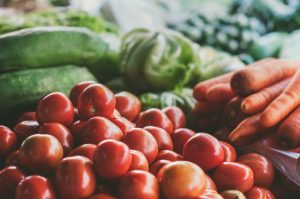06 Oct My Child Has Decided to Become a Vegetarian…
 Many children decide to become a vegetarian because of concerns over animal rights. Other children feel that it is healthier or they are influenced by their peers. Parents often become concerned that their vegetarian child will not receive an adequate amount of protein or will become deficient in minerals and vitamins. However, a well-planned vegetarian diet can actually be an extremely healthy way to eat. For example, a diet rich in vegetables and fruit is high in fiber and low in fat. This type of diet has been shown to reduce the risk of heart disease.
Many children decide to become a vegetarian because of concerns over animal rights. Other children feel that it is healthier or they are influenced by their peers. Parents often become concerned that their vegetarian child will not receive an adequate amount of protein or will become deficient in minerals and vitamins. However, a well-planned vegetarian diet can actually be an extremely healthy way to eat. For example, a diet rich in vegetables and fruit is high in fiber and low in fat. This type of diet has been shown to reduce the risk of heart disease.
Types of Vegetarian Diets
Vegetarians do not eat meat. There are different types of vegetarian diets.
Lacto-ovo vegetarian: This is the most common vegetarian diet. Does not eat meat, poultry, or fish, but does eat dairy products and eggs.
Lacto-vegetarian: Does not eat meat, poultry, fish, or eggs, but does eat dairy products.
Ovo-vegetarian: Does not eat meat, poultry, fish, or dairy products, but does eat eggs.
Vegan: Does not eat anything that comes from an animal, including meat, poultry, fish, eggs, dairy products, or honey.
Nutrients
Children on a vegetarian diet need to be monitored to ensure they are receiving the following key nutrients:
- Protein
- Calcium
- Vitamin D
- Iron
- Vitamin B12
- Zinc
Protein: Most parents do not realize that vegetables are an excellent source of protein. For example, 100 calories of broccoli contain 11.1 grams of protein compared to 6.4 grams of protein found in 100 calories of beef! Other great sources of protein include beans, nuts, grains, and dairy products.
Calcium: Dairy products are the easiest way for your child to meet their calcium requirements. If your child is on a vegetarian diet that does not include dairy, then other sources of calcium include green leafy vegetables, dried figs, and soy products.
Vitamin D: Besides dairy and eggs, other sources of vitamin D include mushrooms, soy, and fortified cereals.
Iron: Beans, soy, dried fruit such as figs and raisins, pumpkin seeds, broccoli, and spinach are good sources of iron.
Vitamin B12: Vitamin B12 is an essential vitamin found in animal products including dairy products and eggs. Some cereals and breads are fortified with B12, but a completely vegan diet may require taking additional B12 supplements.
Zinc: Zinc is found in dairy products, soy, nuts, and beans.
Healthy Lifestyle
Your child can be vegetarian and healthy as long as it is carefully planned. Eating a variety of vegetarian foods will provide a well-balanced diet that meets all the essential nutrients your child needs. A vegetarian diet can be a healthy choice for all kids, as long as it is properly planned. Your child may benefit from meeting with a registered dietitian. If you are concerned that your vegetarian child may not be meeting their nutritional needs, then speak to your child’s physician.
If you would like more information about gastrointestinal (GI) digestive disorders and nutrition in children, please contact Dr. Mona Dave’s Frisco Office or Request Appointment Here.